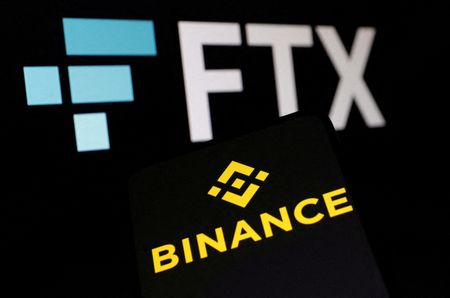By Gertrude Chavez-Dreyfuss and Elizabeth Howcroft
NEW YORK/LONDON (Reuters) – A week of turmoil culminating in major crypto exchange FTX filing for bankruptcy has left investors questioning the viability of a sector already bruised by the bitcoin bubble bursting and closures of key market players.
The collapse of several crypto lenders, including Celsius and Voyager, major tokens terraUSD and Luna, and hedge fund Three Arrows Capital, had rung alarm bells even before the blow-up of FTX, headed by Sam Bankman-Fried. Crypto markets have also come under intense pressure this year as rising interest rates prompted investors to ditch riskier assets. FTX filed U.S. bankruptcy proceedings on Friday and Bankman-Fried stepped down as chief executive officer after a rapid liquidity crunch at the group left FTX scrambling to raise about $9.4 billion from investors and rivals.
Top cryptocurrency bitcoin was trading at around $16,946, down 3.5% on Friday and had dropped below $16,000 for the first time in two years on Wednesday when rival exchange Binance abandoned a rescue for FTX.
“The fallout from FTX isn’t something that’ll be resolved in hours,” said Antoni Trenchev, co-founder of crypto lender Nexo.
“This will remain a dark cloud over the industry and institutions will stay away until the dust settles.”
Knock-on effects are already rippling through the crypto industry. Crypto lender BlockFi early on Friday said it was pausing client withdrawals until there was clarity on FTX. FTX’s swift fall from grace followed heavy speculation about its financial health that triggered $6 billion of withdrawals in just 72 hours earlier this week. The company had published a valuation of $32 billion as recently as January.
“From a financial side, it’s fair to say that confidence is going to be somewhat shaken because if you can’t trust FTX then what can you trust?” Yat Siu, co-founder of Hong Kong-based investor Animoca Brands, told Reuters on Wednesday.
JPMorgan analysts said in a client note on Wednesday that the trouble at FTX “creates a confidence crisis and reduces the appetite of other crypto companies to come to the rescue.”
Speaking at the Token2049 crypto conference in London on Wednesday, Andrei Kazantsev, global head of crypto trading at Goldman Sachs, said “counterparty risk is starting to be top of mind” for some clients once drawn to crypto trading by high volatility and yield.
Unlike traditional corporations and financial firms, crypto entities operate in a regulatory gray area. For instance, deposits at crypto lenders are not insured by the government. In the case of FTX, U.S. residents cannot trade on its global platform due to strict regulations for the crypto space in the United States. FTX has a U.S. partner, FTX.US, but its offerings are more limited than the global platform. FTX’s bankruptcy filing makes stricter regulation of cryptocurrency exchanges more likely, said Joseph Edwards, investment partner at Securitize Capital.
“We’re likely to step back years in terms of retail market access to all but the most basic products.”
“It’s another set of headwinds adding to an already deleterious macro situation, so many will lose their appetite for the inherent risk involved in the sector,” he said.
‘POSTER CHILD’ NO MORE
It was only a few months ago that Bankman-Fried, 30, had been seen as a crypto white knight, salvaging beleaguered crypto firms that faltered as prices cratered.
“The show must go on, the industry needs to keep growing, but it’s definitely a step-back in itself when you see the poster child of the industry being put in this position,” said Jean-Marie Mognetti, chief executive of crypto asset manager CoinShares.
“It is a lesson which seems to keep repeating itself,” he added, citing certain star traders in various companies that ended up in trouble.
While the meltdown would not stop companies from creating new blockchain-based products, Animoca’s Siu said it “probably will create a little bit of a chill effect” for institutional investors entering crypto markets.
To be sure, some investors continued to have faith in the sector.
In an interview with CNBC on Thursday, Microstrategy Chairman Michael Saylor said he will continue to acquire bitcoin when the opportunity presents itself. On Wednesday ARK Invest, led by high-profile crypto proponent Cathie Wood, bought shares in FTX rival exchange Coinbase Global.
Max Boonen, co-founder of digital asset liquidity provider B2C2, said FTX’s problems have set the crypto space back by six months. Speaking at the Token2049 crypto conference in London, he suggested that investors will to have to rely more on credit asset managers doing due diligence on private financials.Ken Lo, co-founder at Hong Kong-based crypto exchange and custodian Hong Kong Digital Asset Exchange, said counterparty risk, which comes from a lack of transparency and information disclosure, underscores the need for “clear regulatory framework and vision statement.”
Graphic: Top crypto exchanges by volume Top crypto exchanges by volume https://graphics.reuters.com/FINTECH-CRYPTO/jnpwygnndpw/chart.png
(Reporting by Gertrude Chavez-Dreyfuss in New York and Elizabeth Howcroft in London; Additional reporting by Georgina Lee in Hong Kong; Editing by Alden Bentley, Catherine Evans and Matthew Lewis)

